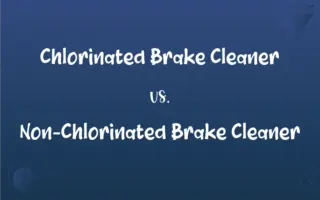DNA Testing vs. Paternity Testing: What's the Difference?
Edited by Aimie Carlson || By Janet White || Published on April 3, 2024
DNA testing analyzes genetic material for various purposes, including health and ancestry, whereas paternity testing specifically determines a child's biological father.

Key Differences
DNA testing encompasses a wide range of genetic analysis, including health risks, ancestry, and relationships. Paternity testing is a specific form of DNA testing used to establish if a man is the biological father of a child.
DNA testing uses various techniques like PCR, sequencing, and microarrays for comprehensive genetic analysis. Paternity testing focuses on comparing the child's DNA with that of the alleged father, looking for matching markers.
DNA testing is used in medicine, forensics, genealogy, and personal health. Paternity testing is primarily used in legal and personal cases to establish fatherhood.
DNA testing can have broad legal and ethical implications, including privacy concerns and data use. Paternity testing is often involved in custody, child support, and inheritance cases, raising specific legal considerations.
DNA testing results can be complex, requiring professional interpretation for health or ancestry information. Paternity testing results are usually straightforward, indicating whether a man is or isn't the biological father.
ADVERTISEMENT
Comparison Chart
Purpose
Broad genetic analysis
Establishing biological fatherhood
Methodology
Various techniques for comprehensive data
Specific comparison of paternal markers
Applications
Health, ancestry, forensics, genealogy
Legal, custody, inheritance issues
Legal Implications
Privacy, data usage
Child support, custody, legal fatherhood
Result Interpretation
Can be complex and varied
Generally straightforward and definitive
ADVERTISEMENT
DNA Testing and Paternity Testing Definitions
DNA Testing
Tracing genetic heritage and lineage.
His DNA testing showed a diverse ethnic background.
Paternity Testing
Determines if a man is a child's biological father.
Paternity testing resolved the custody dispute.
DNA Testing
Analyzing genetic material for various purposes.
Her DNA testing revealed a predisposition to certain health conditions.
Paternity Testing
Clarifying doubts about biological relationships.
Paternity testing brought clarity to their family dynamics.
DNA Testing
Used in criminal investigations to identify suspects.
DNA testing was crucial in solving the cold case.
Paternity Testing
Comparing DNA of a child and a potential father.
Paternity testing showed a match in genetic markers.
DNA Testing
Identifying genetic risks for diseases.
DNA testing can preemptively alert individuals to potential health issues.
Paternity Testing
Used in court for child support and custody cases.
The court ordered paternity testing to determine child support.
DNA Testing
Establishing genetic relationships.
DNA testing confirmed they were long-lost siblings.
Paternity Testing
Establishing legal rights and inheritance claims.
Paternity testing was necessary for the inheritance claim.
FAQs
What is paternity testing?
Testing to determine if a man is a child's biological father.
What is DNA testing?
Analysis of genetic material for various purposes.
Can DNA testing reveal health risks?
Yes, it can identify genetic predispositions to diseases.
Is paternity testing accurate?
Yes, it's highly accurate in determining fatherhood.
What methods are used in DNA testing?
Techniques like PCR, sequencing, and microarrays.
What can ancestry DNA testing show?
It can trace genetic heritage and lineage.
How is paternity testing done?
By comparing DNA of the child and the potential father.
Can paternity testing be done before birth?
Yes, through prenatal DNA testing methods.
Does health insurance cover DNA testing?
It varies, usually not for ancestry, but sometimes for health-related tests.
Are DNA test results confidential?
Generally, yes, but it depends on the testing service.
Can paternity be established without the father's DNA?
Indirectly, through close relatives, but direct testing is preferable.
Are there privacy concerns with DNA testing?
Yes, especially regarding data handling and sharing.
Can DNA testing detect mutations?
Yes, it can identify genetic mutations and variants.
Is consent needed for paternity testing?
Yes, especially for legal testing, consent is necessary.
What happens if paternity is confirmed?
It can impact child support, custody, and inheritance rights.
What if paternity testing is inconclusive?
Further testing or alternative methods may be required.
How long does paternity testing take?
Typically, results are available within a few days to weeks.
Are at-home paternity tests reliable?
Generally reliable, but not always admissible in court.
Is DNA testing used in forensics?
Yes, for identifying suspects or victims.
Can DNA testing determine siblings?
Yes, it can establish sibling relationships.
About Author
Written by
Janet WhiteJanet White has been an esteemed writer and blogger for Difference Wiki. Holding a Master's degree in Science and Medical Journalism from the prestigious Boston University, she has consistently demonstrated her expertise and passion for her field. When she's not immersed in her work, Janet relishes her time exercising, delving into a good book, and cherishing moments with friends and family.
Edited by
Aimie CarlsonAimie Carlson, holding a master's degree in English literature, is a fervent English language enthusiast. She lends her writing talents to Difference Wiki, a prominent website that specializes in comparisons, offering readers insightful analyses that both captivate and inform.






































































